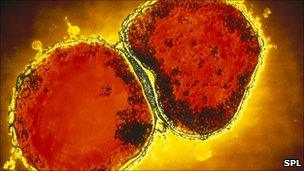Gene link to meningitis infection
- Published

Meningitis is a major cause of death in children worldwide
A set of genes which renders people more prone to meningitis has been pinpointed by researchers.
The international team compared DNA from 1,400 people with bacterial meningitis and 6,000 healthy individuals, Nature Genetics reports.
They found differences in a family of genes involved in the immune response seem to make people more or less susceptible to the infection.
It is hoped the findings will lead to the development of new vaccines.
The researchers were looking at meningitis caused by the Neisseria meningitidis bacterium, which leads to swelling of the lining of the brain and blood poisoning.
It is not the first time researchers have attempted to find out if some people are more likely to catch meningitis because of their genetic make-up.
But results have previously been unclear, probably because of the small number of people studied.
In the latest study, researchers first scanned the whole genetic code of 475 British patients with meningococcal disease and 4,700 healthy individuals.
They found a clear difference in a small set of genes known to be involved in the immune system response.
When they looked again in two other European populations they found the same result.
Vaccine
The genetic differences found means that, in some people, the bacteria is able to evade the immune system and cause infection, while other people' immune systems are better equipped to fight it off.
The genes encode for a protein called factor H, and factor H related proteins.
Where there are flaws, the meningococcal bacteria is able to bind to these proteins to prevent the immune system from recognising it - almost like a Trojan horse - enabling it to get a foothold.
Study author Professor Michael Levin, an expert in international child health at Imperial College London, said the findings would be particularly useful in developing a vaccine against meningitis B, which is now responsible for most cases in the UK.
There is already an effective vaccine against meningitis C.
"It seems that the genetic differences in factor H between people is what determines susceptibility or resistance.
"It suggests it may be an important protein to include in vaccines, and factor H is already one of the candidates for meningitis B vaccine."
He said the results will also help scientists better tailor vaccines to be effective in the whole population.
It may also open up avenues for improving treatment once people have bacterial meningitis, he said.
Sue Davie, chief executive of the Meningitis Trust, said: "This exciting work has thrown new light on factors that play a part in determining why some people get meningococcal disease and others do not.
"Further work will be needed to establish just what the genetic differences are in the genes which actually cause this susceptibility to invasive infection, but this is a promising start."